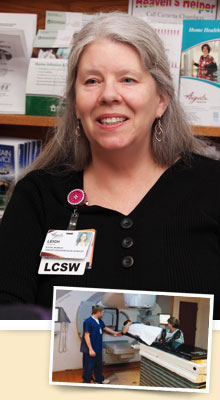Cancer Center Bridge & Hematology Bridge Funds
Funds Pick Up Where Insurance Ends
The fight against cancer is hard enough, but when a patient is not employed or covered by a health insurance plan, the cost of transportation to appointments, prescription drugs, and nutritional supplements can become overwhelming. That is when the Cancer Center Bridge or Hematology Bridge Fund steps in to help.
For more than a decade, the Bridge Funds have helped provide for some of the basic needs of cancer patients undergoing treatment. Grateful patients and family members, Cancer Center volunteers, and caring members of the community make financial contributions to support the fund. The Bridge Funds would not exist without the generosity of those individuals or organizations that raise money for the funds through special events.
“Dealing with cancer or a blood disorder and its treatment creates enough anxiety and stress for patients and their families,” says John Girard, director of the Augusta Health Center for Cancer & Blood Disorders. “The Bridge Funds cover the gap for patients in need, allowing them to focus on treatment and getting healthy.”
“Every day, I see people who are just knocked off their feet by cancer or a blood disorder. They are worried and scared. They are just trying to make it through treatment the best they can. The Bridge Funds help these patients during one of the most difficult times of their lives. It makes a huge difference.”
Leigh Anderson, LCSW
Licensed Clinical Social Worker
Augusta Health Cancer and Blood Disorders Center

Cancer patients need excellent clinical care, compassion, and understanding. They may also need personalized help and assistance with barriers or obstacles to care. The Bridge Funds are used to “bridge the gap” when a critical need arises and no other assistance is available. Gifts to one of the Bridge Funds makes it possible to provide immediate help to patients and their families including:
- Medication assistance for prescriptions that are not covered by Patient Assistance Programs or some insurance providers.
- Assistance with the cost of nutritional supplements not covered by insurance. This includes both the oral and tube feeding supplements.
- Upfront costs for the uninsured cancer patient who might need outpatient surgery for port placement prior to starting IV Chemotherapy.
- Help with transportation costs via provision of gas vouchers or cab rides.
- Assistance with purchasing wigs, turbans, hats, mastectomy bras, and lymphedema sleeves.
